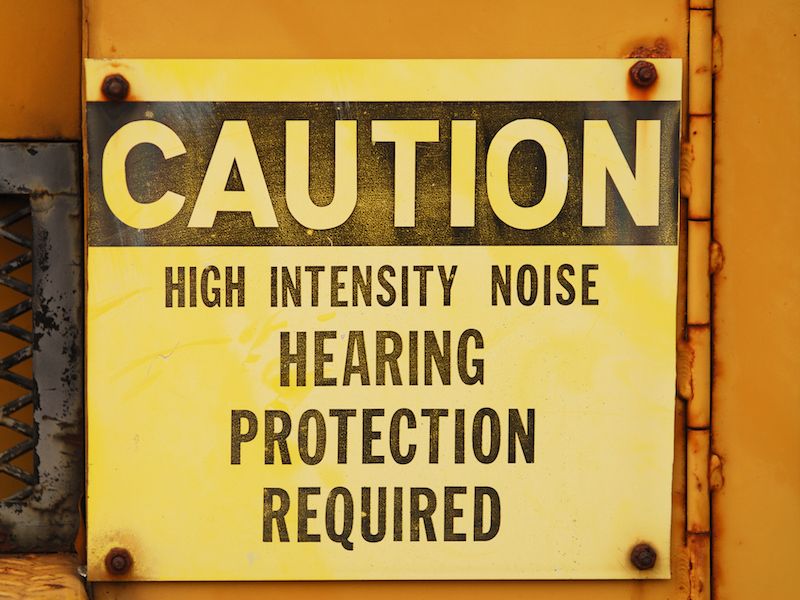
It’s one thing to realize that you should safeguard your ears. Knowing when to protect your ears is another matter. It’s more difficult than, let’s say, knowing when you need sunscreen. (Is it sunny and are you going to be outdoors? Then you need sunscreen.) It’s not even as simple as determining when to use eye protection (Working with dangerous chemicals? Doing some building? You need to wear eye protection).
With regards to when to wear hearing protection, there seems to be a big grey area which can be risky. Frequently, we’ll defer to our natural tendency to avoid hearing protection unless we have information that a specific activity or place is hazardous.
Determining The Risks
In general, we’re not very good at assessing risk, especially when it comes to something as intangible as long term hearing problems or loss of hearing. Let’s take some examples to demonstrate the situation:
- A very loud rock concert is attended by person A. 3 hours is approximately how long the concert lasts.
- Person B runs a landscaping company. She spends a considerable amount of time mowing lawns, then goes home to a quiet house and reads.
- Person C is an office worker.
You might presume that person A (let’s call her Ann, to be a little less clinical) may be in more hearing danger. Ann leaves the concert with her ears ringing, and she’ll spend the majority of the next day, trying to hear herself speak. Assuming Ann’s activity was hazardous to her ears would be reasonable.
Person B (let’s call her Betty), on the other hand, is subjected to less noise. Her ears don’t ring. So it must be less hazardous for her ears, right? Well, not quite. Because Betty is mowing every day. The truth is, the damage accumulates a little bit at a time even though they don’t ring out. Even moderate noise, if experienced with enough frequency, can harm your ears.
What’s occurring with person C (let’s call her Chris) is even more difficult to sort out. The majority of individuals understand that you should safeguard your hearing while running machines such as a lawnmower. But while Chris works in a quiet office, she has a very noisy, hour-long commute each day through the city. What’s more, she sits at her desk and listens to music through earbuds. Does she need to consider protection?
When You Should be Concerned About Safeguarding Your Hearing
Generally speaking, you need to turn down the volume if you have to raise your voice to be heard. And you should consider using earmuffs or earplugs if your surroundings are that loud.
The cutoff should be 85dB if you want to be scientific. Noises above 85dB have the capacity, over time, to result in injury, so you should think about using ear protection in those scenarios.
Many hearing specialists advise using a specialized app to keep track of decibel levels so you will be aware when the 85dB has been reached. These apps can tell you when the surrounding noise is approaching a hazardous level, and you can take proper steps.
A Few Examples
Even if you do download that app and bring it with you, your phone might not be with you everywhere you go. So a few examples of when to protect your ears may help you formulate a good standard. Here we go:
- Listening to music with earbuds. OK, this doesn’t require protection but does require care. Whether your music is going directly into your ears, how loud it’s playing, and how long you’re listening to it are all things you should pay attention to. Think about getting headphones that cancel out outside sound so you don’t need to crank up the volume to dangerous levels.
- Commuting and Driving: Spending all day as an Uber or Lyft driver? Or maybe you’re just hanging around downtown for work or boarding the train. The constant noise of city living, when experienced for between 6 and 8 hours every day, can cause damage to your ears over the long haul, particularly if you’re cranking up your music to hear it over the commotion.
- Exercise: You know your morning cycling class? Or even your evening yoga session? You may think about using hearing protection to each. The loud volume from instructors who play loud music and microphones for motivation, though it might be good for your heart rate, can be bad for your hearing.
- Household Chores: Even mowing a lawn, as previously stated, requires hearing protection. Chores, including mowing, are most likely something you don’t even think about, but they can result in hearing damage.
- Using Power Tools: You recognize you will require hearing protection if you work all day in a factory. But what if you’re simply working in your garage all day? Most hearing specialists will suggest you wear hearing protection when using power tools, even if it’s just on a hobbyist level.
These illustrations may give you a suitable baseline. If there is any doubt, though, use protection. In the majority of cases, it’s better to over-protect your hearing than to leave them subject to possible injury in the future. If you want to be able to hear tomorrow, protect today.
